Contents
Page List
Guide

COMING
OF AGE
IN THE
WAR ON
TERROR
R ANDA A BDEL -F ATTAH is a well-known writer and scholar who is currently a postdoctoral research fellow in the Department of Sociology at Macquarie University, Sydney. Her books include Islamophobia and Everyday Multiculturalism and she serves on the editorial boards of Journal of the Contemporary Study of Islam and Continuum: Journal of Media & Cultural Studies.
Randa is also a prominent Palestinian and anti-racism advocate, and the multi-award-winning author of 11 novels published in over 20 countries. She is co-editor of the anthology Arab, Australian, Other and is currently adapting her bestselling novel Does My Head Look Big in This? into a feature film.
A NewSouth book
Published by
NewSouth Publishing
University of New South Wales Press Ltd
University of New South Wales
Sydney NSW 2052
AUSTRALIA
newsouthpublishing.com
Randa Abdel-Fattah 2021
First published 2021
This book is copyright. Apart from any fair dealing for the purpose of private study, research, criticism or review, as permitted under the Copyright Act, no part of this book may be reproduced by any process without written permission. Inquiries should be addressed to the publisher.
 A catalogue record for this
A catalogue record for this
book is available from the
National Library of Australia
ISBN 9781742236865 (paperback)
9781742244938 (ebook)
9781742249476 (ePDF)
Internal design Josephine Pajor-Markus
Cover design Design by Committee
Some names have been changed to protect the privacy of individuals.

CONTENTS
INTRODUCTION
TRACING RACE
How did this terrorist stay in the shadows,
hiding among us in plain sight?
Prime Minister Scott Morrison
It was balmy winter weather during the Queens Birthday long weekend in 2019. We were spending the public holiday in a popular seaside town on the New South Wales Central Coast. My sister-in-law, a veiled woman, went to the small fair set up in the waterfront area to buy showbags for her children. When she returned, she told me that as she had made her purchase, the vendor had leaned in close to her and quipped: Ill have the Lebs back any day.
My sister-in-law wasnt sure what he meant but had instinctively corrected him: Im Palestinian.
The vendor had motioned to her hijab. I mean you guys. You guys come here, and you spend; youre generous with your kids. The Indians and Asians are tight-arses.
Later that day, as we were walking through the fairground, my sister-in-law pointed out the vendor to me. He looked about as quintessentially Aussie battler as you could get. I took a closer look as we walked past and recognised him as one of the people Id interviewed six years prior, when Id been conducting my doctoral fieldwork in the town. My interviews with residents explored their feelings about the demographic shift that occurred in the town during peak season. A shift from an unmistakably Anglo-majority population to multicultural mainly Western Sydney and obviously Lebanese Muslim crowds. The vendors words had been a familiar refrain from the people Id spoken to back in 2013: At least the Lebanese Muslims spend money, the Lebanese Christians dont. So thats a good thing at least. Others had more strident views: It feels different in those periods. Like youre being taken over by the wogs from Western Sydney; The Arab race. Its a different race to the Anglo race. Islams different. I say shoot the bloody lot of them! Drop a bomb on Beirut and another one in Iraq! Theres your war on terror done.
When Id interviewed the vendor, Paul, hed said:
The Lebs are family people and they spend on their families which is good for us. We put up with them because theyre good for tourism. It feels like a takeover in those months, they take up a lot of space. But the majority are okay. Its only a minority who are bad and, like, the terrorists you see on the news.
Race, critical race scholar David Theo Goldberg argues, has the conceptual capacity to morph in meaning and significance in response to prevailing social and economic conditions. Its for this reason that Pauls words to my sister-in-law didnt shock me. On the contrary, I was both repelled and somewhat impressed. Impressed again by racisms shameless, chameleon-like capacity to morph and adapt whenever it sets its gaze on a new object of resentment. In one equal-opportunity racist moment, all brown bodies were collapsed as undesirable, under the label wog. In another moment, Muslims fluctuated between Leb and Arab, and the Arab race became Islam. Muslims were okay or terrorists. And now? Now, you guys (a mish-mash of Muslim, Leb, Palestinian, Western Sydney, the Middle East ?) were acceptable, while Indians and Asians were not.
Pauls words reminded me of the slogans and signs that marked the Cronulla race riots in Sydney in 2005. If one were to momentarily forget the deadly intent and terror they unleashed on a minority community, one can almost admire racisms remarkable shape-shifting talents. The chants happily subsumed religion, culture and ethnicity into one amorphous target: Fuck the wogs, Fuck off, Lebs, Get Lebs off the beach, Kill the Leb. There were T-shirts with offensive slogans about Lebs, wogs, Allah and Prophet Mohammed. Slogans painted on peoples bare backs: We grew here, you flew here; If you dont love it, leave it; Ethnic cleansing unit. To add to the confusion about whom the rioters were targeting, two Bangladeshi men and an Afghan man were attacked because Leb was also a signal for any person of colour. Like the rioters at Cronulla, Paul was simply availing himself of a whatever-synonym-turns-you-on smorgasbord of inspiration for racisms Aussie Aussie Aussie, oi oi oi fantasy.
In his book Is Racism an Environmental Threat? anthropologist Ghassan Hage writes about racisms fluidity and how racists happily move from one vague form of racism to another with little care for logical contradictions or inconsistencies. But he goes further to criticise the tendency for anti-racist academics to take these vague statements seriously, spending time judging them on terms racists could not care less about. As somebody involved in anti-racism activism, I return to Hages analysis often, and it came to my mind as I was processing the vendors words. Hage writes that racists have always managed to be exceptionally efficient specifically by being vague.
Nobody encapsulates how efficiently and shamelessly all-over-the-place racism can be better than Australian politician Pauline Hanson. When she first entered Australias political space in 1996, leading her new party One Nation, she rallied against Aboriginals, multiculturalists and Asians. I remember Hansons emergence vividly. I was a 19-year-old Melbourne University Arts/Law student when I was called on a few weeks from the 1998 federal election to stand as a candidate for the newly formed party Unity Say No to Hanson. Back then I was a Muslim defending Indigenous people and Asians. In 2016, Hanson opportunistically reinvented herself on a platform that switched to Australia being in danger of being swamped by Muslims, not, as she had campaigned in 1996, Asians. Now Asians and Indigenous people were defending us.

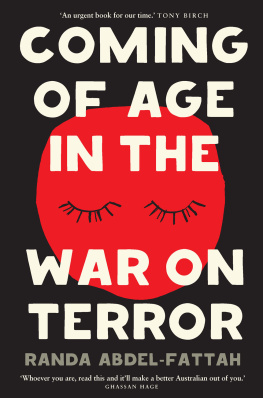

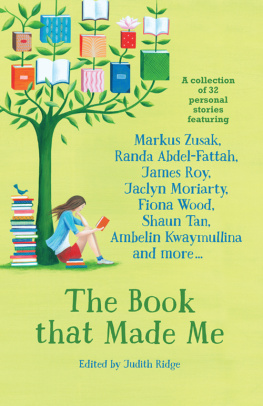
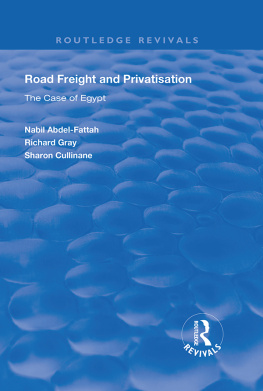
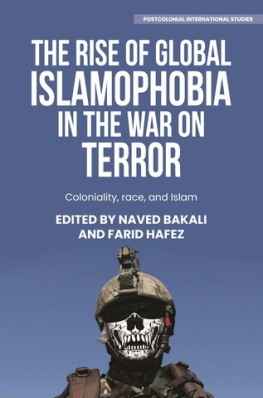
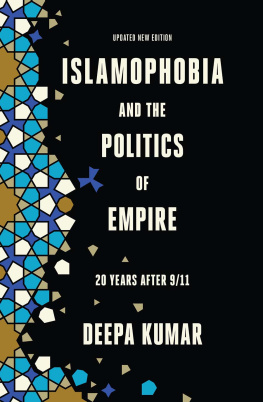
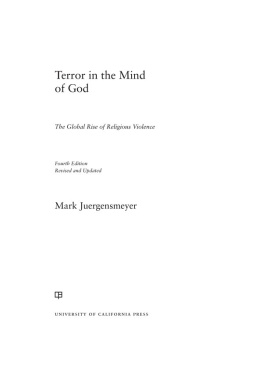

 A catalogue record for this
A catalogue record for this